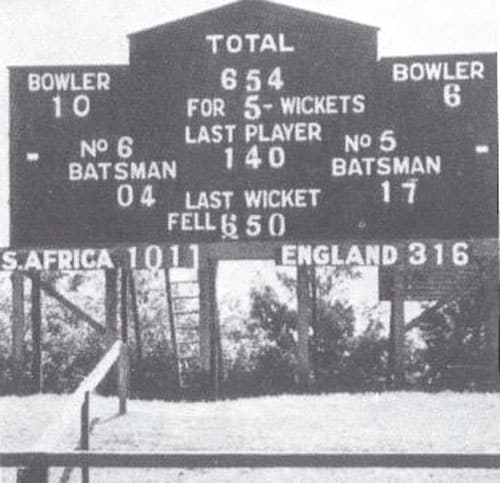
The game that after 11 days had to end in a draw
It all began on the warm, sunny morning of Friday, March 3, 1939, and ended on the dark, stormy autumn of Tuesday, March 14. The justice match between South Africa and England was played under the modality without time limit, and on that tenth day the circumstances meant that it had to end in a draw.
I Course of the match between South Africa and England
Cricket is a sport that, like baseball, has long- term matches at all situations of competition. The important public leagues are used to games lasting between 2 and 4 days, and in the big transnational events the limit is set at 5 days of competition. Tests without a time limit are a type of justice that was included in 1926 after a series of tied matches between Australia and England. As there was only one game left before the departure of the Australian platoon back to their country, the authorities decided that the fifth and last game would be played without any time limit, therefore avoiding protective play and precluding a possible fifth draw. That game, the first of the modality, ended with a palm for England.
After that game, tests without time limits came popular in major transnational competitions, with a aggregate of 30 games being played in the following 13 times, which in more or less days ended with a winner. Australia used to be the only country that requested to play without a time limit, but in the 1939 match between South Africa and England, it was decided to play the fifth match without a time limit, for reasons analogous to what had happed between Australia and England. in 1926.
II Toss during the justice match
The match began on March 3, and until the 14th they continued to play( with three days of rest in between) without any winner. That Tuesday, March 14, 1939, England had palm within reach, just 42 runs down. But on the other hand I had an unanticipated time problem. The boat they had reserved so far in advance was leaving Johannesburg on the 17th of the same month, and they still demanded two days to get from Durban to Johannesburg by train.
After numerous conversations, and given the significance of returning on that boat, given the constancy of transport at the time, they made the public brigades of South Africa and England, after further than 43 effective hours of play, call the game over with a tie, just what they tried to avoid by designating a match without a time limit.
The influence of this fact was similar that this match has not only gone down in history for being the only match without a time limit that ended in a draw, but also for being the last match played in the modality without a time limit. Since that clash in Durban, all transnational tests that have been played have been subject to the strict limitation of 5 days of play.